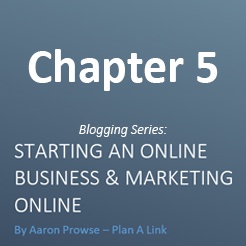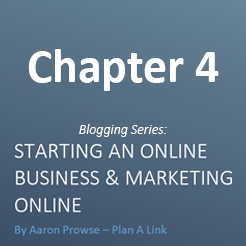Starting a Business Part 1: Research & Develop your idea

Starting An Online Business & Marketing Online: Chapter 1 Research & Develop your idea
I am writing an e-book to help people answer questions on how to start a business online and how to promote and market the business. This will be available for free to download once I have finished writing the content but I will be releasing chapters into the blog to assist people as the book develops. I hope this helps you in your venture and would love to hear your feed back.
Research & Develop your idea
I am assuming that you already have your idea for your business, but you need to research and develop the idea so that you know that this is the right idea for you and more importantly will it make money or a difference. The reason I say will this make money or a difference is because some people start businesses for more than money such as charities and non-profit organisations. This eBook is mainly aimed at profit generating businesses.
Firstly we need to consider, what is your idea? Is it a product or a service? Is there competitors already selling your product or service?
More than likely someone will already be doing what you are planning to do, so how are you going to do it better than them? What is going to be your unique selling point? What is your target market? Where is your target area?
These are all questions you need to answer and we will go through them in more detailed sections.
Researching before doing is the most critical element to any successful business. I am not saying it can break your business, but would you rather spend a few days researching or a few years trying to improve your service?
Product or a Service?
Products are easier to sell, this is because you are more than likely just marketing the product you are getting manufactured, or reselling another person’s product (especially in the early days). This means your time will be spent marketing the product and improving it for your customers.
Service is more personal and leaves more room for error, but generally is harder to do depending on the idea. For example Plan A Link runs a service where we provide web design for small businesses & start up’s. Each customer that comes to us is different, so it’s very hard to apply a cookie cutter to each of their websites. So the experience our customer’s gets will vary as every case is unique. With this in mind we need to ensure that there is systems in place to keep the top level experience the same. In my opinion, I prefer a service providing business at its much more personal to the customer and you get to work in different environments and different circumstances.
Who is your competitors?
Identify your competitors and work out exactly what they are doing and try to see how you can improve it. Sometimes where it’s cost effective to do so, purchase their product or service and see how they operate! This will save you a lot of time in research and trying to review your business once you are off the ground. Imagine you can test how their business systems work and get the point of view that your potential customers will get from your product or service. This gives you the opportunity to perfect your service or product and do it better. If this is not an option then visit their website and try and answer these questions:
Who are they targeting? – If they are a strong competitor they will know who pays the most and who doesn’t. Once you have identified who they are targeting then you know who to go after, but it also can leave the question on who are they forgetting to target? This could be a potential market too.
How good is their website? – This is a very important factor. Personally, I will not purchase any product or service from a poor website, just for the simple fact that if a company has skimped and saved on their website or built it very poorly, what’s to say they aren’t holding back on the service they will be providing you?
What is their USP (Unique Selling Proposition)? – What are they attempting to use as a USP and how could you improve it?
What additional services or products are they offering? – I learned a quote that was very powerful to myself and when it becomes apparent to you, you too will fully understand what it means. “You have to be in business to know business.” – This quote means to me that you don’t know what sells, until you are in business. With Plan A Link, we knew about SEO and online marketing, but didn’t know how to sell or approach clients about it. If we had worked this out from the beginning we would have achieved a more efficient business faster.
How many sales are they getting a month? – This can be quite tricky to discover and takes some manual work, but for example with a product based business they will usually sell on eBay or another market place to increase their sales. There may be information giving a hint to how many sales they have on their products for example by their feedback score (eBay). With service based business it may be a bit trickier and depends on how active the business is. With service based businesses they usually upload the content to their website when they complete a job in the form of a portfolio to help entice more customers, but you can use this page to discover and keep an eye on how much they are doing a month. Or track a business reviews. This will get your minimal costs without actually asking the business how many sales they have a month.
There is many ways to calculate the sales but another insight that might be worth you looking into is the amount of traffic keywords are getting on google using the keyword planner at Google AdWords.
You!
Now you have learned more about your competitors and potential market you now will have some idea of what you are going to do. Here is a small to do list to help you with this chapter.
- Who is your target audience? – When I ask this question, I want a narrow answer for example not just 18-40 year olds, I want to know what they work as, where do they hang out? The more information you know about your customer the easier you can access and sell your product or service to them.
- What is your USP? – Do you think your USP is stronger? And will a customer come to you over your competitors?
- What additional services or products can you provide to help keep your customers once you have secured them?
- Have you found the correct Niche for you?
- How many sales do you need a month to quit your job?
- What sort of suppliers are you going to need? What’s your costs? – Its best to do this in the form of a cost analysis spreadsheet to calculate the monthly outgoings of the business.
- Who could join your power team or could you affiliate with to get more customers?
- What problem does my product or service solve for my customers?
Don’t Fear Failure!
People always say to me “are you not sacred” or “be careful” or something a long them lines. Now I appreciate they are looking out for me, but I have a strong self-belief in the work I do and myself. If I fail, I will have learnt 100 lessons more than someone who didn’t try at all. So don’t fear failing. Fear being stuck where you are for the rest of your life, or being under appreciated. THAT is something to fear.




